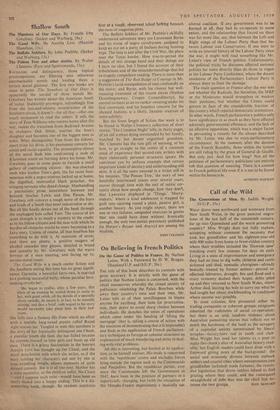On Believing in French Politics
On the Game of Politics in France. By Nathan Leites. With a Foreword by D. W. Brogan. (Stanford U.P. and O.U.P., 36s.) THE title of this book describes its contents with great accuracy. It is strictly with the game of
politics that Nathan Leites is concerned, with the ritual manoeuvres whereby the closed society of politicians inhabiting the Palais Bourbon while away their country's time and their own. Mr.
Leites tells us of their unwillingness to blame anyone for anything, their taste for procrastina- tion, their desire to avoid sharp clashes between individuals. He sketches the series of operations which come under the heading of 'lifting the mortgage' (that is, taking a course of action with the intention of demonstrating that it is impossible) and finds in the application of French parliamen- tary techniques to foreign or colonial situations an explanation of much blundering and delay in*deal- ing with vital problems.
All this is interesting, but limited in its applica- tion, as he himself realises. His study is concerned with the 'republican' centre and excludes forces lying outside the regime such as the Communists and Poujadists. But the republican parties, ever since the Communists left the Government in 1947, bEvre been in the position of partners in a superfAciaily changing, but (with the exception of the Mendes-France experiment) a basically un- altered coalition. If any government was to be formed at all, they had to co-operate to some
extent, and the relationship thus forced on them was far more like, say, that between the Left and Right wings of the Labour Party than that be- tween Labour and Conservative. If one were to write an internal history of the Labour Party since the war, it might well read something like Mr. Leites's view of French politics. Unfortunately, the political tricks he discusses affected national politics far more directly than do those in vogue at the Labour Party Conference, where the decent insulation of the Parliamentary Labour Party is always there to limit the damage.
The main question in France after the war was not whether the Radicals, the Socialists, the M RP or the Moderates would strengthen or weaken their positions, but whether the Centre could govern in face of the considerable fraction of the country which rejected democratic institutions. In other words, French parliamentary politics only have significance in as much as they have affected adversely governmental efficiency, and the lack of an effective opposition, which was a major factor in preventing a remedy for the abuses described by Mr. Leites, was due to extra-parliamentary circumstance. At the moment, after the decease of the Fourth Republic, those within the system are still ruling by the grace of General de Gaulle. But only just. And for how long? Not all the pettiness of parliamentary politicians can entirely rob that question of meaning. There is a content to French political life even if it is not to be found within the hem icycle.
ANTHONY HARTLEY


































 Previous page
Previous page